DO-IT News January 2022

Volume 30, Number 1
Below are the articles from the DO-IT News January 2022 newsletter. These articles can also be seen all on one page at the Full Newsletter option.
The Chance to Attend Conferences Across the World Online
Everyone has adjusted to the pandemic in many ways in their personal life and careers. For those of us in AccessComputing, we pivoted from on-site to online presentations, meetings, and events. As conferences moved online, I was able to take advantage by engaging in more discussions, delivering a multitude of presentations and poster sessions, and leading many online discussions. At these events, stakeholders have discussed the issues surrounding the conversion of postsecondary on-site courses to online platforms. In the past few years, there has also been a growth in diversity, equity and inclusion (DEI) initiatives and discussions nationwide. In response to these conference themes, I tailored talks about the accessible and inclusive design of online learning and the application of a universal design (UD) framework to underpin these practices to a wide variety of stakeholder groups. Focusing on accessibility and inclusion in computing, I presented at RESPECT, Consortium for Computing Sciences in Colleges, ACM SIGCSE, Computer Science Teachers Association, and HighEdWeb conferences. I also presented on these topics within accessible IT at Accessing Higher Ground and CSUN Assistive Technology conferences.
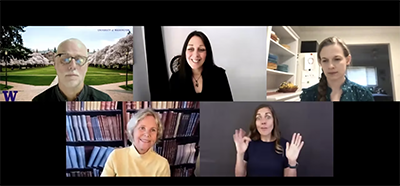
In relation to teaching and higher education, I reached stakeholders focused on pedagogy and the delivery of online and on-site courses in a keynote address at the NWeLearn conference and concurrent sessions at the Online Learning Consortium Innovate, Lilly, Teaching Innovation, American Association of Colleges and Universities Conference on General Education Pedagogy, the Universal Design for Learning conference, the Higher Education Pedagogy conference, and the Association of American Colleges and Universities (AAC&U) conference. DEI-focused practitioners and researchers were engaged in my presentations at the National Summit for Educational Equity; the AAC&U Conference on Diversity, Equity, and Student Success; Northwest Regional Equity Conference; National Summit for Educational Equity; and Inclusive Educators. I talked to researchers and practitioners more specifically focused on disability at the Society for Disability Studies, Multiple Perspectives, Pacific Rim International, CUNY Accessibility, and Association on Higher Education and Disability (AHEAD) conferences. I reached informal science learning professionals at the American Alliance of Museums, Smithsonian Education Association; and University Professional and Continuing Education conferences.
This year I felt like I was living in the digital version of Dr. Seuss’ Oh, The Places You’ll Go. The movement of on-site to online forums gave me an opportunity that I took advantage of—to attend conferences all over the country. One of the highlights was a keynote address I gave at the International Disability Inclusion Symposium hosted by the University of Tokyo titled “DO-IT Framework, Goals, Practices, and Collaborations in Asia.” I hope you too were able to find a silver lining in these challenging times.
New Staff Profile: Eric
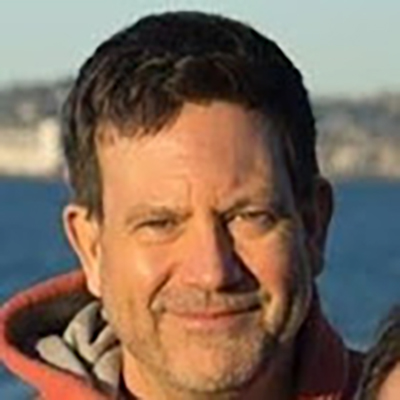
I’m Eric Trekell, and I’m the newest program operations specialist with DO‑IT. I’ll be working on multiple DO-IT programs, including AccessComputing, Neuroscience for Neurodiverse Learners (NNL), The Alliance of Students with Disabilities for Inclusion, Networking, and Transition Opportunities in STEM (TAPDINTO-STEM), and the Alliance for Interdisciplinary Innovation in Computing Education (AIICE) among others. I have an AA degree in political science from Northeastern Junior College and a BA with dual majors in government and history from Adams State University, both located in Colorado, where I grew up. I received an MS in educational administration from Texas A&M University in College Station, TX. Prior to joining DO-IT, I was the director of the Center for Disability Services at Everett Community College for four years and assistant director of Services for Students with Disabilities at Edmonds College for three years.
I’ve spent most of my career thus far in higher education, a lot of it working in resource and retention services focused on underrepresented student populations. I began my career while in grad school at Texas A&M; while getting my master’s, I worked full-time as a student organization advisor in the Memorial Student Union Student Programs Office. Then I spent two years as assistant director for Student Services at Texas A&M’s former branch campus in Japan. Upon returning from Japan, I became a lecturer with the Academic Success Center, where I taught student success and first-year-experience courses, as well as coordinated supplemental instruction services for the pre-med and political science programs. After a rollerblading accident and two surgeries on my left ankle, I wanted to make sure I could still ski, so I left Texas to return to the mountains of Colorado. In that move, I also accepted the opportunity to work as the founding director of a new TRiO Student Support Services program at my alma mater, Adams State University. Eventually, I left Colorado again and spent seven years as an assistant dean of students and the first professional, full-time director of the Gender and Sexuality Campus Center at the University of Wisconsin-Madison, where I met my husband.
Said husband is from Europe, so we left the U.S. in 2010, when he finished grad school and his visa expired. We married in Iceland and prior to relocating to Seattle in 2014, we lived first in Amsterdam, then in London. We loved being able to go to all the (free!) museums in London, but we also enjoy camping and hiking. For that reason, we always have both WA state and national annual parks passes with us when we travel in Washington or around the US.
What Do Phase I Scholars Do?
This year, DO‑IT Phase I Scholars participated in a three-week, online Summer Study session. They learned about college life; explored online resources; interacted with peers, staff, and mentors; and had fun. The DO‑IT Scholars program started in 1993 as an experimental project for teens with disabilities nationwide. While it is usually held on campus at the University of Washington, this year brought new challenges as well as new opportunities. It is currently open to Washington State teens and is supported by the State of Washington.
The DO-IT Summer Program
Have you ever applied to get into a summer camp program? Not too long ago, I applied to the DO-IT Scholars Summer Study program. At first, I was a little skeptical because I’m not used to getting out of my comfort zone to try new things. But my cousin used to work for the program, and she recommended the program to me and convinced me to apply. I was so surprised when I got the email that I got in! I thought that out of all the students who applied, I might not make it. I had to wait a few months to hear back, but it was so great that it was good news.
I began to feel excited to try something new, but scared because I didn’t know all these new people. During the first meeting, everyone was super welcoming. I really admired how the teachers took the time throughout the program to check up on each student and made sure that we were all understanding everything that was going on. I also really liked that if you were struggling or didn’t really feel comfortable sharing your problems, you could send a private chat or text to one of the teachers and they would reach out to you at the end of the day to check in. They also sent out surveys that encouraged you to ask any questions you might have had.
I also really enjoyed the night activities. There were new activities and something for everyone. At these events, both Phase I and II got together and watched movies, played games, and sometimes even just shared in conversations. I genuinely wish more people knew about the DO-IT Scholars program since it has been such a great opportunity.
SnackMagic Snack Packs
SnackMagic is a company that sends snacks boxes to you in the mail that you can customize with amazing items such as snacks, beverages, and other products. Since we were participating in the DO-IT Scholars program from home, we got to look forward to SnackMagic each week!
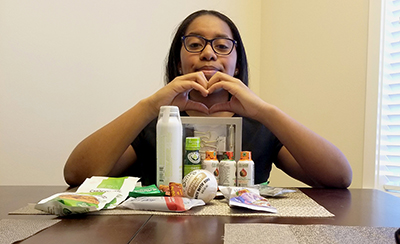
SnackMagic has a variety of snacks and beverages to choose from. If you have specific dietary food restrictions or allergies, SnackMagic gives you the option to choose which kinds of foods or drinks you may want to add to your snack box such as vegan, vegetarian, and others.
When you click on the snack you want, it will show you a description of what ingredients and nutrients are in the snack or beverage. The description will even show what is not in the snack or beverage in case someone is allergic to any of the ingredients. If you enjoyed the snack and want to find more like them, the description will also show a variety of other snacks from the same company.
One of the most useful categories is the “Work and Play” section, where you get to pick items such as journals, pencil holders, etc. You can even add a nice touch to your home by buying a vase with roses or get a few coffee mugs for your morning coffee.
The final thing you can add to your snack box is an item such as a “last minute touch” or a “mystery snack” that gets added without any extra money spent. This was fun because it added something cool or tasty as a bonus! I loved all the cool things I got to pick from DO-IT.
What We Liked During Summer Study
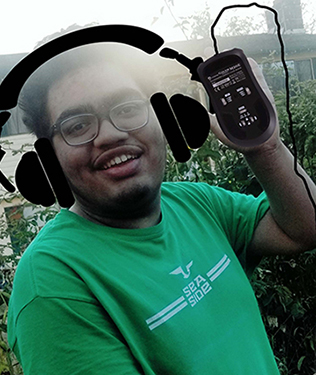
Alex D.
One of the things I enjoyed from the DO‑IT Scholars program was the neuroscience presentation by Dr. Chudler. I thought that the stem cell research was very interesting and I wonder how far it will progress in the future. Another thing I liked was learning about web design, where I was able to code part of a website using HTML.
Warren
One of the things I liked best during Summer Study was getting to work with Lindsey (a 2014 Scholar) who just graduated from the UW with a degree in animation, which is one of my dreams. She helped me figure out how to find good photos and use PowerPoint to create an image collage and merge them to make a cool new design. Together we finished a picture of me with headphones and a mouse, which was cool.
Star Wars Virtual Movie Night
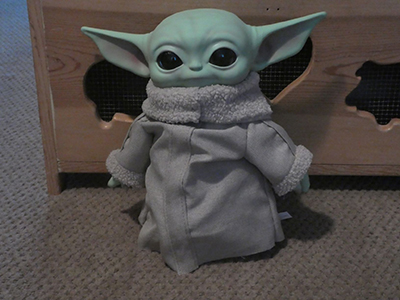
We had multiple virtual movie nights throughout Summer Study. On July 14, we had our first movie. I had an awesome time watching Star Wars: A New Hope on Zoom with my fellow Phase 1 Scholars and DO-IT Staff Tami Tidwell and Kayla Brown. One of my favorite features of having a movie night on Zoom was the chat, because we were able to make comments without ruining the movie by talking over it.
The funniest comments from the Scholars and staff were jokes about the contradictions in the movie. My favorite comment was when a Scholar pointed out the Imperial Stormtroopers’ lack of aim after Ben Kenobi said their aim was precise. This was my favorite because once it was pointed out, another Scholar later commented to point out when the Imperial gunners shot poorly. I loved watching Star Wars with my fellow Scholars and can’t wait to have more conversations in the chat at the next movie night!
Perspectives on Disability
Hi. I’m Jaida, and I have cerebral palsy. Cerebral palsy, or CP for short, happens when the oxygen supply to the brain is cut off during birth. This usually happens when the baby is born too early—that is what happened to me—or sometimes the umbilical cord is wrapped around the baby’s neck. In either case, the result is some damage to a part of the brain. In my case, the nerves that control my legs were the most affected. This type is called spastic because the muscles are tight and hard to control. My arms and fingers are hard to control as well, but not as much as my legs.
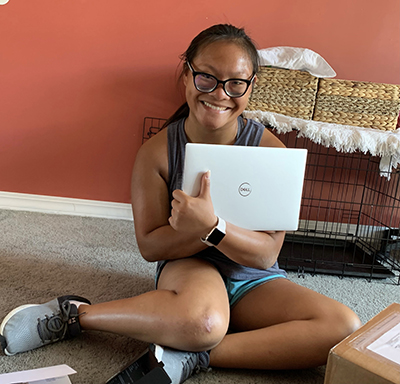
My vision is also affected. Even with glasses, I can’t see the board in class or even across the hall. Sometimes my eyes see things, but don’t get the message to my brain, and I’ve been known to trip on things that are right in front of me in plain view.
CP affects each person differently. Some people with CP can’t eat or swallow, and are fed through a feeding tube. Some use a wheelchair, and some could be sitting right next to you, and you’d never know they have CP because they are barely affected.
Because of my CP, people see me as a disability before seeing me as a person. This can be frustrating, because I am not the girl with cerebral palsy; I am a girl who happens to have cerebral palsy. When people asked me questions, it used to make me feel self-conscious. I would try to push the fact that I have a disability to the back of my mind and not think about it. I didn’t like people asking me questions because it reminded me that I have a disability. Now though, it doesn’t bother me as much, and I know people ask because they are concerned and curious. I know that my disability makes me unique and gives me perspectives that other people don’t have in the world.
Cerebral palsy is not the only disability out there. There are many others, and they each have different effects, which can impact people mentally, physically, or both. People with disabilities can often be looked upon more negatively than others. This is why the words people use to describe those who are disabled are important. Certain words are harmful and disrespectful. Using these types of words in a joking way tends to imply someone did something stupid. This annoys me, since it is implying that people with disabilities are stupid. I know some people think I am stupid because of my disability until they get to know me. They judge me on the way I look or move. I would ask all of you to get to know someone before you judge them, and please choose your words carefully.
Some people also assume that because of my disability, I can’t do certain things, and it’s infuriating because I can do most of the things they assume I can’t do. One time a doctor told me that I wouldn’t be able to learn how to walk. Now, I am on my school’s cross country team, and run at least 2.5 miles every day. Another time, someone told me I shouldn’t run on the playground because I’d fall. I did it anyway. One therapist said that all they wanted was for me to be able to sign my signature legibly enough so that I could sign documents. Now I write anything and everything legibly just fine.
Throughout my lifetime, I’ve had many people tell me that I can’t do something. However, people telling me I can’t do something is also the best thing they could ever do for me, because I am then determined to try and prove them wrong. Although a lot of people have told me I wouldn’t be able to do things, I have had more people try and help me and encourage me, which I am very thankful for.
Sometimes, when people try to help me, I get uncomfortable because I just want to do it on my own, but I do understand that they’re trying to be helpful. I appreciate how everyone, including teachers and students, have continued to support me in everything I do. That is what has gotten me to where I am today.
People always tell me that I take having a disability really well. I do most of the time, but sometimes I don’t, and I sit there and cry. I know I can’t change it, but sometimes I wish I was just a normal 16-year-old girl. However, having a disability has taught me so much. It taught me how to never give up when the thing I want seems impossible to attain, and how to appreciate others and not take things for granted. Remember the saying “don’t judge a book by its cover?” The same thing applies to people with disabilities. Don’t assume that just because someone is disabled, they can’t do something.
There are many ways in which we are different, but there are even more ways we are alike. We can elevate others by appreciating their differences and encouraging each other to support those differences. One final thing to remember and the most important to me is this quote by Carl Gustoff Jung, “I am not what happened to me. I am what I chose to become.”
Juggling Two Summer Camps
This summer, I participated in both the Changemakers in Computing program (CIC) and the DO-IT Summer Study program. These experiences provided me with valuable insights into computing for social good and ways that I can ask for accommodations in college for my hearing loss.
Throughout the CIC and DO-IT Summer Study programs, I was introduced to two different ways society views disability: the medical and social models of disability. The medical model of disability views disability as a defect within the individual that can only be “fixed” by health care professionals.
This model portrays disability negatively and degrades individuals with disabilities. The social model of disability paints disability in a better light, where society’s features inhibit an individual from fully accessing resources and functions due to existing barriers. Most importantly, incorporating accessibility features into society can support people with a diverse range of abilities. This comparison between the two models opened my mind to how society portrays disability in varying ways with different opinions.
During the CIC program, I learned about programming fundamentals and created a hackathon project about internet connectivity, tying together computing with social issues. The DO-IT program allowed me to critically think about how I can advocate for myself with regards to accommodations for college and the variety of assistive technology that are designed by people with varying abilities to support diverse backgrounds.
Culminating my experiences with the DO‑IT and CIC programs, I look forward to continuing to build personal projects that incorporate universal design and accessibility and sharing social issues with others using computing.
Let’s DO-IT
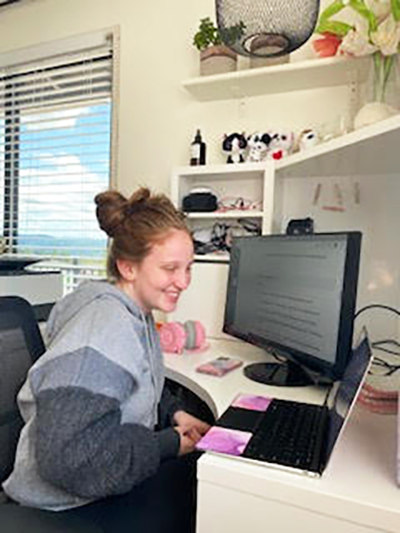
At first, I wasn’t sure what the DO-IT Scholars program was really all about. However, after starting it, I got to learn about so many cool new thing including different disabilities, accommodations to help, and how to advocate for myself.
The DO-IT Scholars program is great because I’ve met so many people who are like me and have a disability. It makes me feel not alone. It’s nice to have people understand what I go through and their support makes me feel happy.
I’ve learned that I have the right to ask for accommodations that I need to help me in school and in life. I have the right to be like everyone else and get the same opportunities to learn and do the things that I like.
Lastly, I’ve learned that it’s important to advocate for yourself because if you don’t speak up, you won’t get your needs met. DO‑IT has taught me so many different ways to help me succeed!
My Dream Home
There were a plethora of fun evening activities over the course of this year’s Summer Study, but by far my favorite was the “Dream Home” Canvas discussion. I loved hearing everyone’s ideas for their dream homes, and it was an amazing way to get to know one another. One key part of our conversation was accessibility in the home, and we all had similar ideas of how to make our homes accessible. Thinking about what you want in your dream home is great, but getting the chance to discuss it with others is even better.
The “Dream Home” canvas discussion happened on Wednesday the 21st, and it was incredibly fun. I thoroughly enjoyed hearing the differences in what came to mind when we all thought of our dream home. While I was mostly focused on how my house would look and how I would decorate it, others thought of the experiences they would like to have in their home. In her main post, Kayla Brown said, “I think it would definitely be a one-level house with a ramp to get through the front door, and a yard for my dog to run around in. I don’t really want anything too fancy, but a room just for crafting would be [amazing]. I love crafting and it would allow me to have some space to learn how to sew!” House features were a prominent part in this discussion, and everyone seemed to have a feature they dreamed of. I mentioned many features I would like in my home, but the ones I wanted the most were “a small library/office with a bay window and a comfy couch to sit and read on. My bedroom would be big, with a small couch to relax on and a four-poster bed.” Talking about our dream homes was a great bonding experience, and I loved hearing everyone’s thoughts.
A key part of our dream home discussion was accessibility. The most mentioned accessibility features were ramps, elevators, and stair lifts. Cleo Chen said in her main post, “[o]ne thing I would put in my dream home would be having either an elevator or slide chair up and down the stairs so that people can easily get upstairs without walking. This would make it so people who have trouble walking up/down stairs can still access the upstairs of my house.” Although most of our discussion was about home features and experiences, accessibility was important to all of us, and it was heavily highlighted in our discussion.
While the main focus of our discussion was how our dream homes felt and functioned, we all talked about the importance of accessibility. Talking about what we wanted in our dream home was an amazing way of getting to know one another, and I look forward to getting to know everyone more in the coming summers.
What Do Phase II Scholars Do?
Phase II Scholars returned for their second Summer Study. They met the Phase I Scholars, learned about college life and career preparation, and participated in two-week workshops learning about the environment and digital media.
Phase II NOAA Workshop
This year the NOAA Workshop had a variety of activities that were both enlightening and informative. During 2021, we took part in these activities online over Zoom. Even without the joys of experiencing the NOAA camp in person. DO-IT and NOAA still managed to keep everyone captivated, with the intro to the diverse food web, the impacts from even the smallest organism, and what we as the audience can do to keep both our environment and our native organisms preserved and safe.
Rooted in Rights
Every summer at DO-IT Summer Study, Phase II Scholars participate in workshops led by experts in various fields in a hands-on, specialized experience. This summer, DO-IT partnered with Rooted in Rights (RIR), an organization that produces videos and social media campaigns exclusively on disability rights issues. Students produced short videos exploring topics of their choice, many focusing on disability rights. This experience exposed Scholars to all aspects of video-making, including storyboards, scripting, and editing.
Here is what some participants had to say about their time with RIR instructors:
- Braxton: I’ve done video production as a hobby before, so it was super interesting and fun to take my hobby and connect it to another part of my life. With all of the staff there to help, it was reassuring to know that I was on the right track at every step.
- Manuel: The RIR workshop is a perfect way to learn how to combat ableism and share your experience. You also get to learn about what it’s like to make a film and learn some helpful tips!
- Miles: The RIR workshop was a very great experience for me. I had a fun time making my video. I would gladly recommend it to other Scholars.
- Clarice: I really enjoyed the RIR workshop, since I was able to talk about my disability (deaf) in a creative way and spread more awareness by posting the video on TikTok. My peers have been more advocating since posting the video, all thanks to RIR!
You can check out RIR and DO-IT Scholars’ past collaborative videos on the Rooted in Rights' website.
The Recommendations of the Summer!
As the days get shorter, we trade short sleeves for sweatshirts and heavy-duty raincoats. The crisp morning air is getting colder with every waking morning. It is a stark reminder that summer is officially coming to an end, and this year we all prepare for the hustle and bustle of an awkward hybrid remote and in-person activities this fall, whether that is returning to the office, classroom, or embarking on another path of change.
To transition from in-home life to this “new normal,” we asked our 2021 Scholars from Summer Study and Neuroscience for Neurodiverse Learners participants to tell us some of their favorite apps.
Mental Health
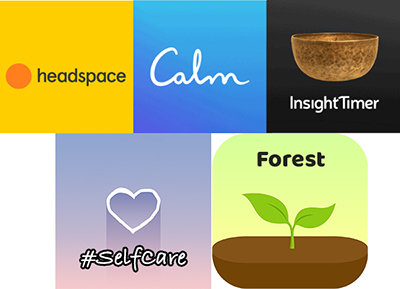
Meditation
After this year, I think we all can use some help taking some time to breathe and reflect. Insight Timer, Headspace, and Calm are all highly recommended for their vast array of meditation techniques. They each offer guided meditations in different forms and offer specific programs for anxiety, sleep, grief, and self-improvement.
Mindful “mindless” games
Meditation is not for everyone; sometimes, it’s best to get lost in a mindless game. #SelfCare combines both self-care and thoughtless fun. It has games centered around affirmations, reflection, and forming health habits.
Organization and Productivity
Digital calendars
Whether it was Google, Outlook, IOS, or old school paper and pen methods, everyone had some kind of calendar to remind them who, what, when, and where. Some utilized both by having their digital calendars send them reminders of classes or meetings and using paper ones for visualization reasons.
Focusing
A lot of students recommended timer systems such as Alexa or their phone’s default option as ways to have focus periods, mindful breaks, or even naps. Having a separate entity like Alexa is excellent for gentle reminders to prepare you for your next meeting—it is not as easy to hit snooze on a talking speaker as it is on your smartphone.
One student recommended Forest, an app that grows a tree as long as you have the app open for a set amount of time. This prevents you from moving to other apps on your phone and allows you to focus on another task. If you close the app before the window closes, the tree dies. If you succeed, the app company will offer you points to plant real trees.
Studying
Note Taking
GoodNote, IOS Notes, OneNote were some of the most popular note-taking apps of the summer. All three apps have the same core features, such as writing to text but differ in stylistic choices and user preferences. OneNote offers a well-developed speech-to-text option, while GoodNote is great for digital notes and uploading pdfs. If you are a traditionalist and like the feel of paper and pen, Rocketbook, Moleskine’s Eclipse, or Livescribe (Symphony or Echo) pens and notebooks are also great options.
Digital reading/listening
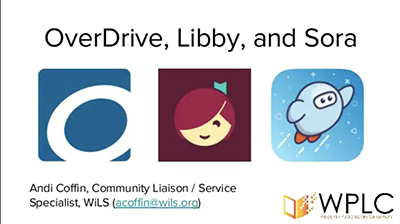
Audible, Kindle, and OverDrive were some of the crowd’s favorites. OverDrive is like a digital public library, where you can rent ebooks, audiobooks, and more for free. In addition, OverDrive owns the free apps Libby and Sora. Libby is a cross-platform app that connects to your local library, while Sora is developed for students. Sora keeps track of assignments, readings, statistics, and notes.
Audible and Kindle both have subscription options that offer student discounts. Unlike OverDrive, there is no wait or return date for their audiobooks or Ebooks. Within Kindle, you can change line spacing, paper color, and the font of your text, including a dyslexic-friendly font. For college students, renting your textbooks using Kindle can save you hundreds of dollars. The in-app note-taking abilities are some of my favorites.
From productivity to mental health to reading, there are millions of apps to be shuffled through to discover what ones get the prime real estate of your home screen. Hopefully, after reading this, you can find some of your new favorites.
AccessComputing Team Member Profile: Anh Hua
My name is Anh, and while attending the University of Washington (UW) in Seattle, I experienced a spinal cord injury, which left me with a permanent disability. While recovering, my rehabilitation counselor provided me with various career-related resources, including information about the Workforce Recruitment Program (WRP), a recruitment and referral program that connects federal and private sector employers with current and recent graduates with disabilities. Participating in WRP ended up being one of the most important programs that has helped guide my career.
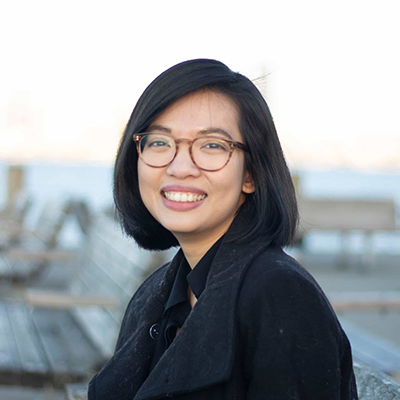
WRP helped me obtain a part-time job after graduation, and while there, I learned about Disability:IN NextGen Leaders, who are college students and recent graduates with disabilities who show talent and leadership in science, technology, engineering, and math (STEM); finance; and business fields. The NextGen Leaders collaborate with corporate partners to prepare for employment through various mentoring programs. I was connected with both the Talent Accelerator Program, an intensive career development opportunity, and the Mentorship Exchange, a six-month career mentoring opportunity for college students and recent graduates with disabilities.
The Talent Accelerator Program prepared me to talk more confidently with employers about my skillsets and abilities, as well as become more comfortable in industry settings, especially as all the employers in the program were committed to disability inclusion.
I also loved the Mentoring Exchange. My mentor not only helped by providing resume critiques and professional advice, but also found various ways to help me explore my interests. I met with my mentor every other week, and we remain in contact. One favorite thing about my mentor was that she gave me sound advice and provided a lot of helpful information about Disability:IN’s Annual Conference.
At the conference, I got to talk with different companies and learn about available positions and the qualities they looked for in candidates. I learned the right questions to ask during an interview, what I should highlight on my resume, and other valuable tips. I loved interacting with the corporate partners, who offered advice about how to succeed in the workplace. I interviewed with four companies while attending the conference, and landed three follow-up interviews. As a result, I received an offer for my current position, working in user experience with The Nielsen Corporation in Chicago.
The Disability:IN’s Annual Conference surpassed all of my expectations. Participating in an event specifically for individuals with disabilities, where people advocated for themselves and others, was a unique and beneficial experience. I not only learned how to talk more confidently about myself, but also about my disability. I also got to meet and network with so many diverse individuals with different disabilities and from different backgrounds. I encourage other young people with disabilities to apply to be NextGen Leaders to get the opportunity to meet other like-minded individuals and find so many different options and activities, both at the conference and beyond.
I believe the best way for employers to attract more young applicants with disabilities is to demonstrate that their company is actively working to recruit, hire, and advance employees with disabilities. This includes companies putting a disability plan in place and investing in disability inclusion. Potential employees need to be supported through the application and interviewing processes, as well as being provided accommodations once hired.
AccessISL Resources and Upcoming CBI
Check out new Knowledge Base articles developed through DO-IT’s Access to Informal STEM Learning (AccessISL) project. The project, a collaboration with the UW Museology program, supports efforts to make informal science learning opportunities more welcoming and accessible to everyone. Recently developed articles include the following and can be found in the AccessISL Knowledge Base:
- California Academy of Sciences: A Promising Practice in Planning for Visitors who are Neurodiverse
- How do I include deaf students in informal learning conversations?
- Riverside Art Museum: A Promising Practice in Improving Access for Natural Science Education
- What is the Center for Advancement of Informal Science Education?
With AccessISL, ISL programs and academic departments nationwide can participate in training, consultation, community building, and activity and resource development. We’ll be developing further Knowledge Base articles and resources during our upcoming virtual AccessISL capacity building institute (CBI) in March 2022. For information about the institute, send an email to doit@uw.edu.
Recommend a DO-IT Scholar!
DO-IT is currently recruiting Washington State high school students with disabilities who are interested in pursuing a postsecondary education.
DO-IT Scholars prepares students for success in college and careers. The DO-IT Scholars program includes two consecutive Summer Study sessions with the University of Washington, where students will participate in labs and lectures with UW faculty, work on projects together, and explore campus and Seattle-area resources. This allows students to experience college life and develop their self-advocacy skills. Each Scholar is provided a laptop and any necessary assistive technology and works with a DO-IT technology specialist on setup requirements. Throughout the school year, Scholars connect with program staff, mentors, and each other. They participate in DO-IT events, complete projects, and receive valuable information and support for the transition to college.
The DO-IT Scholars program is free of charge. Please have the student apply or leave a teacher or parent recommendation online. Applications are due by January 30th!
About DO-IT
DO-IT (Disabilities, Opportunities, Internetworking, and Technology) serves to increase the successful participation of individuals with disabilities in challenging academic programs and careers, such as those in science, engineering, mathematics, and technology. Primary funding for DO-IT is provided by the National Science Foundation, the State of Washington, and the U.S. Department of Education.
For further information, to be placed on the DO-IT mailing list, request this newsletter or other materials in an alternate format, or make comments or suggestions about DO-IT publications or web pages, contact us at
DO-IT
University of Washington
Box 354842
Seattle, WA 98195-4842
doit@uw.edu
www.uw.edu/doit/
206-685-DOIT (3648) (voice/TTY)
888-972-DOIT (3648) (toll free voice/TTY)
509-328-9331 (voice/TTY) Spokane
206-221-4171 (fax)
Founder and Director: Sheryl Burgstahler, Ph.D.
Program Manager: Scott Bellman